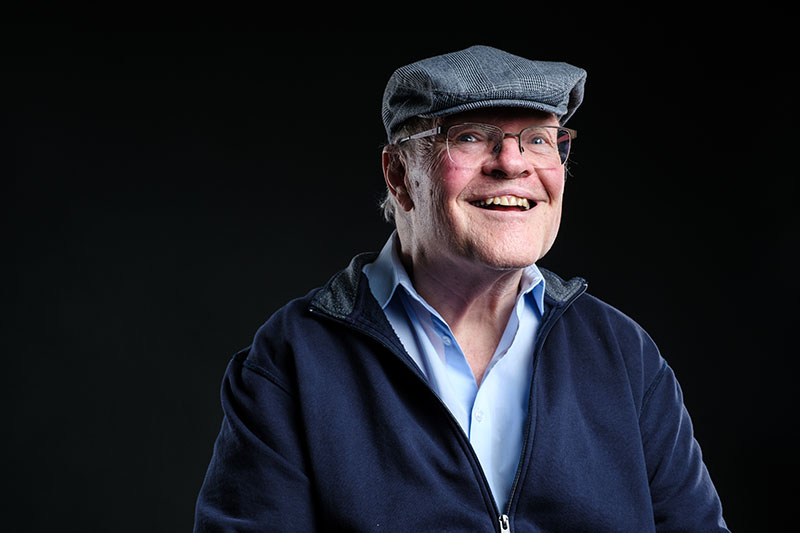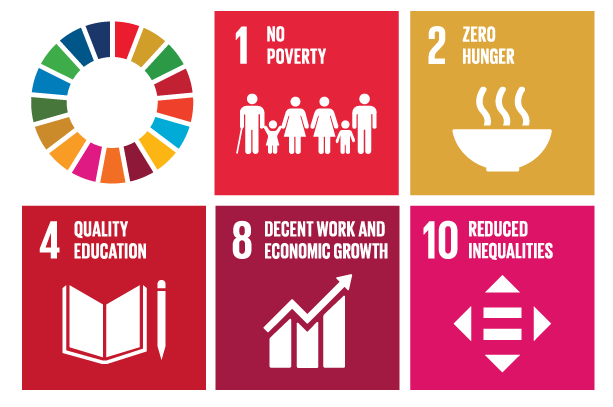A legacy of integrity
Prof Servaas van der Berg of the Department of Economics at Stellenbosch University (SU) has been influential both as an academic and as a public intellectual.
Having turned 71 in January 2024, he has entered what might be called the twilight of his career. Still — perhaps now more than ever, his many years of experience having matured into wisdom — his passion for making a difference shines bright.
“One can be only an observer and say, ‘I’m a scholar. I’m a researcher. I want to know what happens.’ But for me, there’s more. I want to change what happens,” he says.
Early days
So, where did it all start for him, and what makes him tick?
Van der Berg was born in Durban, South Africa, in 1953 to John and Frieda van der Berg, who both worked in the media.
He matriculated from Port Natal High School in 1970, and graduated from the University of Natal (now the University of KwaZulu-Natal) with a BCom and BComHons in 1973 and 1974 respectively.
Hailing from a relatively privileged background and majoring in economics at a predominantly white university in the heyday of apartheid did not blind Van der Berg to the broader socioeconomic realities and political developments unfolding around him at the time.
“My undergraduate studies were interesting, but macroeconomics didn’t speak to me like development economics did, which has at its heart the questions around poverty and inequality.
“What grabbed my attention was the issue of race in the South African context, or more precisely, people being excluded from the mainstream of the economy because of their skin colour,” he explains.
Poverty and inequality
Seeking to understand the twin scourge of poverty and inequality in the context of his home country, and figuring out how best to combat it would become the main focus of Van der Berg’s initial studies and, later, his academic career.
He went on to complete his MCom at the University of Pretoria and his PhD at SU, graduating in 1987 with a dissertation on the relationship between economic growth and the satisfaction of basic needs in South Africa.
As supervisor he had Prof Jan Sadie, who had once earned the scorn of Hendrik Verwoerd, the then Minister of Native Affairs, for criticising the apartheid government’s policy on black urbanisation.
An academic home
Van der Berg joined SU’s Department of Economics as a lecturer in 1982 and was awarded the title of professor in 1991.
“It’s a wonderful department. I’ve been very happy here. There’s not been much internal politics throughout the years — people respect each other and we get along very well,” he says.
Politics
But note Van der Berg’s qualifier: “internal”. He pointedly uses it because, in contrast, national politics has been a major factor in his work throughout his career. This is hardly surprising, seeing as politics and economics are deeply interwoven.
South Africa’s transition to democracy in the late 1980s and early ’90s afforded Van der Berg the opportunity to make a first-hand contribution to efforts to reshape the country for the future.
He was instrumental in the inception of two initiatives — the Association of Democratic Economists and the Stellenbosch Economic Project — founded to “stimulate debate on a post-apartheid economy”. Moreover, in the late 1980s, he served on the advisory committee of the Macro-Economic Research Group “to assist in drawing up a post-transition economic policy”.
The next year, he “became involved in economic debate” with the then exiled African National Congress (ANC), which was unbanned in 1990 and went on to become South Africa’s first ruling party after the country’s landmark non-racial elections in 1994.
Van der Berg was also part of the technical team that drew up South Africa’s Growth, Employment and Redistribution (GEAR) macroeconomic strategy in 1995/6 “because we felt it was essential that the ANC should commit itself to responsible fiscal policy”.
Drawing a roadmap
More than two decades later, Van der Berg was still at it. In 2009, he was involved in the ‘Roadmap to the Future’ process — a series of meetings held under the auspices of the Development Bank of South Africa and the ANC during the transition from Thabo Mbeki’s national presidency to that of Jacob Zuma.
This critical juncture marked a shift in policy direction for South Africa. Now was the time to influence future policies under Zuma’s leadership. As such, the meetings aimed to chart a course for South Africa’s development under the incoming administration. Education was one of the important topics of discussion.
In his contributions, Van der Berg emphasised the need for regular external tests at a primary school level and the importance of textbooks, which resulted in another two impactful initiatives.
Key educational interventions
The first was the introduction of workbooks to support both learners and teachers, and to better measure work in classrooms. This has been hailed “one of the most important” interventions in the South African schooling system since the transition from apartheid in 1994 and continues to this day.
The second initiative was the introduction of annual national assessments, a set of tests for all learners in Grades 1–6 and Grade 9, conducted in all schools. These tests offered the potential for improved accountability in schools by providing information on the quality of teaching and learning, both to the authorities and to parents.
“Sadly, this initiative eventually failed because of strong objections by teachers’ unions and problems with implementing the test. Nevertheless, the tests were vital in demonstrating to teachers at what level they should assess learners and what standards they should apply,” Van der Berg says.
The National Development Plan
In 2011, Van der Berg was the principal author of a report titled ‘Low Education Quality as a Poverty Trap’. This showed a vicious cycle of poor education in South Africa leading to poor outcomes in the labour market, as well as poor education quality in the next generation.
On the basis of this report, Van der Berg was asked to provide input into the country’s National Planning Commission (NDP), the body established in 2010 to create a long-term plan for eradicating poverty and reducing inequality.
The chair of the commission at the time, then finance minister Trevor Manuel, later said that Van der Berg’s “fingerprints were all over the NDP’s chapter on education”.
An unbalanced society
Have these efforts borne fruit for the country?
“Not enough,” says Van der Berg, because after performing fairly well initially, South Africa’s economy has since stagnated, specifically in the wake of the global financial crisis, followed by the state capture years, the COVID-19 pandemic, and the ongoing deterioration of infrastructure such as electrical power stations.
Also, the government’s main tool in fighting poverty and inequality has been the national budget, “but that can only take you so far,” Van der Berg says.
“We live in a difficult society in which distributional conflict is central. Formal discrimination in public spending was removed after 1994, but we still have a large proportion of the population who are poor because the problem lies in what happens in the labour market, where we have very great inequality.”
To address this problem, Van der Berg believes “one should focus on those things that affect human dignity.”
“If you live in a shack without water, sanitation, or electricity, you are excluded from the economy. Similarly, if you attend a rundown school and nobody does anything about it, there can be no human dignity.
“So, that’s essential — creating a situation in which people are more fully incorporated into society. And education plays a crucial role in that.”
Education first
Van der Berg sees poverty and financial inequality as resulting from the “weak or low levels and quality of education” that most people in South Africa continue to face, “compared to those who have gained relatively high skills [... and can] attract high wages and maintain a relatively good standard of living”.
“So,” he says, “if you want to change the economy, you have to start with the education system.”
But what exactly is it in South Africa’s education system that needs to be fixed? For Van der Berg, one of the most important shortcomings is inequality.
The gap between poor and wealthy schools
“It’s wonderful that some children now have the opportunity to get into good schools, but if it is simply a small minority, we’re still not tackling the main issue.
“I work with the idea that we’ve got only about 15% of the population who are incorporated into the mainstream of the economy, and about 15% of school children who are in well-functioning schools.
“And those two things are linked. It’s those in the other 85% of schools who end up without jobs, or in jobs where they earn very little. This duality in the economy and the education system are still reflections of what we had in the past.
“That was one of my earlier contributions: characterising our education system as bimodal, with two distinct parts — poor and wealthy schools — that function like two separate subsystems,” Van der Berg says.
Speaking truth to power
In the words of Mary Metcalfe, a former minister of education in Gauteng who now serves on South Africa’s National Planning Commission: “Good policymakers must examine their own assumptions and look at all the evidence, not just at what they want to see.”
However, it is safe to assume that some of Van der Berg’s incisive findings and far-reaching recommendations are deeply uncomfortable for politicians and government officials to deal with. And yet he commands respect across circles when he speaks. How does he manage this feat?
“Servaas is able to walk the fine line between advising governments [...] and speaking truth to power,” says Dr Nic Spaull, one of Van der Berg’s former colleagues who is now with the Bill & Melinda Gates Foundation.
“He has been bringing policymakers, researchers, and practitioners together over many years, building trust and a shared understanding of where we need to go,” says Carol Nuga, the former head of planning, strategy, research, monitoring, and evaluation in the Department of Basic Education. She has since joined the Mastercard Foundation as its head of impact for education.
“Servaas has always been respectful and kind, which sets him apart from many other researchers. He has integrity and works transparently. Also, you don’t get the idea that he’s always looking for bad news. He is measured, identifying challenges but also acknowledging progress,” says Nompumelelo Mohohlwane, a deputy director in the Department of Basic Education.
But what are Van der Berg’s own thoughts about this?
“We’ve built up a fair degree of trust between ourselves and policymakers. I think the important thing is that people understand we are on the same side — we ultimately want the same things,” he says.
An enduring legacy
Van der Berg’s career embodies a steadfast commitment to using his role as academic to fight poverty and inequality in South Africa.
He has had a big influence on the country’s education policy, but perhaps his most enduring legacy will be a unique brand of honest analysis and evidence-based solution finding in the tackling of socioeconomic challenges.

Prof Servaas van der Berg
Photo by Stefan Els
Written by Desmond Thompson

Stellenbosch University currently hosts 50 research chairs, 20 of which form part of the South African Research Chairs Initiative (SARChI), funded by the Department of Science and Innovation (DSI), through the National Research Foundation (NRF).
Useful links
SU’s Research on Socioeconomic Policy (RESEP) group
SARChI Chair in the Economics of Social Policy
Research with real-world impact
X: @MatiesResearch and @StellenboschUni

The research initiatives reported are geared towards addressing the United Nations’ Sustainable Development Goals numbers 1, 2, 4, 8, and 10, and goals number 1, 2, and 18 of the African Union’s Agenda 2063.